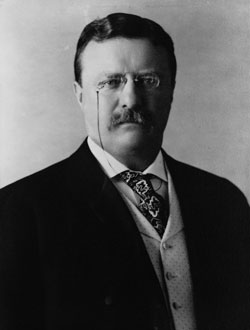Teddy Roosevelt was a Trust Busting Environmental Conservationist Who Helped Establish the Panama Canal
 Theodore Roosevelt’s reputation as a trust buster, a major conservation figure with regards to the environment puts him in the argument as one of the best presidents. His trust busting led to monopolies being destroyed and made the American presidency a centerpiece of the morning newspapers with photos and easy interview access.
Theodore Roosevelt’s reputation as a trust buster, a major conservation figure with regards to the environment puts him in the argument as one of the best presidents. His trust busting led to monopolies being destroyed and made the American presidency a centerpiece of the morning newspapers with photos and easy interview access.
T. Roosevelt’s role as a trust buster is very famous. During his presidency, he dissolved 44 monopolies to avoid corruption in corporations and capitalism. He believed in fighting for the consumers to not pay astronomical prices that could be associated with monopolistic economy. He sought to protect the consumer and bring to the forefront labor and management issues, through the establishment of the Department of Commerce and Labor. He helped disrupt the J.P. Morgan trust with railroads and regulate rail prices for the consumer. Roosevelt’s idea of progressivism led to a working relationship between businesses and labor groups. Progressivism is based in use of expertise to identify and solve a nation’s problem while eliminating waste and corruption.
T. Roosevelt’s ability to stand up for capitalism but not let it get out of hand was a major part of his presidency. His focus was on the consumer while letting businesses make a profit and on corruption in business could be used today as a model because today as business profits rise, the consumer and worker gets lost in the shuffle. According to the Census Bureau, the corporate profits before taxes in 2009 were $1,317,000,000,000 before taxes, while the federal minimum wage is $7.25 an hour. My belief is that T. Roosevelt would be concerned with such a large gap between the businesses and workers
T. Roosevelt was considered by many scholars the first conservationist president. He established the United States Forest Service, proclaimed five national parks and signed the 1906 Antiquities Act, under which he proclaimed 18 new U.S. National Monuments. He placed approximately 2330 million acres of land into public protection.
T. Roosevelt would be concerned with the amount of land that the United States loses because of business and profits.
He said in a speech, “The man should have youth and strength who seeks adventure in the wide, waste spaces of the earth, in the marshes, and among the vast mountain masses, in the northern forests, amid the steaming jungles of the tropics, or on the desert of sand or of snow. He must long greatly for the lonely winds that blow across the wilderness and for sunrise and sunset over the rim of the empty world.”
He was a warrior for the environment and sought to keep the beauty of Earth around for future generations. He traveled to multiple places to push environmental policies in the United States and abroad.
T. Roosevelt’s major international contribution was the Panama Canal. After Roosevelt put political pressure on Columbia to allow Panama’s rebels to succeed, Panama sold the canal area for $10 million which opened up shipping and trading opportunities. By helping out a struggling rebellion, Roosevelt got what he wanted and gave more trade options for the world to travel.
Roosevelt had his flaws like any president but as far as T. Roosevelt goes, he improved the American economy by allowing consumers to buy and put big business in its place, explained why nature is an important issue to all and contributed to international trade relations. He may not have the resume that Frank Delano Roosevelt has but it’s not too shabby. T. Roosevelt famously said, “Speak softly and carry a big stick.” Roosevelt backed up his statements with action and that is the role of an American president.
IMAGE TAKEN from archives.com


